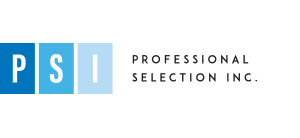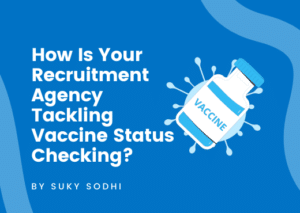How Is Your Recruitment Agency Tackling Vaccine Status Checking?
Let’s talk about the issues that are arising in the recruitment sector as a result of vaccine status checking.
I’m increasingly concerned that our industry is sleepwalking into making decisions that will have long-term consequences for the future success and survival of individual recruitment agencies.
With each day that passes, I’m hearing more and more examples of recruitment agencies that are being asked to screen candidates according to their vaccine status. Yet decisions taken on the fly about whether to take on this responsibility could have serious long term implications.
Let me ask you this: have you sat down as a leadership team and decided what your agency’s position is when a client asks you to screen candidates according to vaccine status?
If you haven’t yet, you should make this a top priority.
Here are some of the key risks and implications I think we need to be considering today, so we don’t find our agencies tarnished or unprofitable in the coming years:
- Reputational damage
- Loss of business from unvaccinated hiring managers
- Increased workload and lower probability of a successful hire
- Harms your diversity and inclusion
- Damages your ability to recruit and retain for your own business
- Charging a retainer and higher fee rate to compensate
I’m not going to discuss the moral issues around whether people should or shouldn’t get vaccinated, or whether it’s right or wrong for companies to seek to hire only the vaccinated. It’s a given that, unless governments globally legislate against the practice, there will be companies that decide they want to only hire the vaccinated. So this blog is about the implications of this and how you choose to respond to such requests. Let’s dive in.
The reputational risk for staffing agencies
There’s a big reputational risk for a staffing agency that takes on the role of rejecting candidates because of their vaccine status. You’ve built up trust and credibility in your market niche and now you’re going to damage that goodwill with a portion of your candidate market.
Will candidates all make the distinction that it’s not your agency that’s choosing to reject unvaccinated candidates, but rather the decision of the employer? Or will this practice be seen as something that you support through your actions in implementing it? At the very least, it doesn’t seem a stretch to say that there will be a portion of your candidate market you risk alienating – which can only harm your placement success rates (and the value of your business) in future years.
Worse still, negative candidate reviews could start springing up online and all the years spent cultivating a 5-star rating could be destroyed… and I shudder to think of the repercussions if your agency ever featured in a news report about candidates being discriminated against in this way.
So take this risk with your eyes fully open.
Loss of business from unvaccinated hiring managers
It’s not just candidates who may choose not to get vaccinated. There are also hiring decision makers who’ve made that choice – and by definition will be working in companies that do not require employees to be vaccinated. What if those hiring decision makers choose not to work with you if they see you discriminating against others who have made the same vaccine choice that they have?
The biggest danger here is that you may simply not know it’s even happening. Once it’s known in the market that you’re screening out unvaccinated candidates, you could fall out of the running to work on new assignments and never have the chance to win these decision-makers over with other considerations.
Increased workload and lower probability of a successful hire
We don’t need to delve into these points in detail, as they’re pretty obvious to anyone in recruitment. Firstly, you’re going to increase the work your agency needs to undertake if you have to establish the vaccine status of every candidate. Arguably you’ll not just need to ask the question, but actually get proof or a signed statement from the candidate that they are vaccinated. Plus, you’re only going to establish that someone is ineligible after you’ve invested quite a bit of time sourcing and approaching candidates (I can’t see LinkedIn making your vaccine status something that’s displayed on your profile anytime soon, can you?).
Secondly, your chances of making a successful hire are potentially diminished. If every unvaccinated candidate is ruled out, then your chances of putting forward a candidate who goes on to be made an offer is diminished. Some roles will just go unfilled. Others will be filled by candidates who aren’t such a good fit – and who subsequently leave and trigger a fee rebate or a replacement candidate clause.
The bottom line is that there’s more work for you and a lower chance of earning a fee.
Harms your diversity and inclusion
There’s an interplay between all these considerations, as we’ll see when we consider the diversity and inclusion angle. We’ve been taking great strides as an industry to strengthen our clients’ diversity and inclusion efforts through our hiring practices. For some employers, demonstrating a focus on diversity and inclusion has become a key buying factor when choosing between alternative recruitment suppliers.
So how does that fit with screening for vaccine status? In short, it doesn’t.
Whether you look at ethnicities or religions, there are social groups who are less likely to get vaccinated. So screening out candidates who are unvaccinated has to discriminate against certain groups more than others. How do we square that with embracing diversity and inclusion to the fullest possible extent? This of course has the potential to lead to reputational damage and to a loss of business – and hence the interplay between all these considerations.
Damages your ability to recruit and retain for your own business
We’ve been looking outwards so far, but there’s another angle to consider – which is how your own agency will be impacted. Your ability to hire and retain recruiters for your own agency could be dealt a blow. What if a portion of recruiters don’t wish to be associated with agencies that work with employers to screen out candidates in this kind of way? Can you afford to miss out on talent for your own business when the market is so buoyant and making recruiting hires is a key to your own growth?
Charging a retainer and higher fee rate to compensate
There’s a lot of potential downside for recruitment agencies in all of the above. It stands to reason that if an employer is going to put your reputation on the line, increase your workload and reduce your chances of earning a fee, then the fee structure for working with them needs to be revised.
If you decide to accept the role of vaccine screener (or indeed working on any roles that have vaccination as a prerequisite) you should be charging a premium on your usual % placement fee. Arguably I would say you should charge a retainer (or higher retainer) too for undertaking this additional work for them and taking on the associated risks.
Final thoughts
In a recent survey undertaken by Manpower Group, employers reported the biggest hiring intentions since the survey began back in 1962. However, more than two-thirds of employers (69%) reported that it’s hard to fill roles – a 15-year peak for the second conservative quarter.
Against this kind of backdrop, you don’t have to work with employers who make demands around vaccination status. There are plenty of other businesses with roles to fill. But the danger is that, if you haven’t taken a conscious decision as a leadership team about this issue, your agency could end up sleepwalking into accepting terms and risks that don’t make commercial sense. If you’re going to do that and accept all the risks I’ve outlined above, at least adjust your commercial terms to redress the imbalance that is otherwise creeping in.
I hope this is helpful food for thought. If you’re a business owner who’d like to discuss any of the above, you’re welcome to book in for a call.



